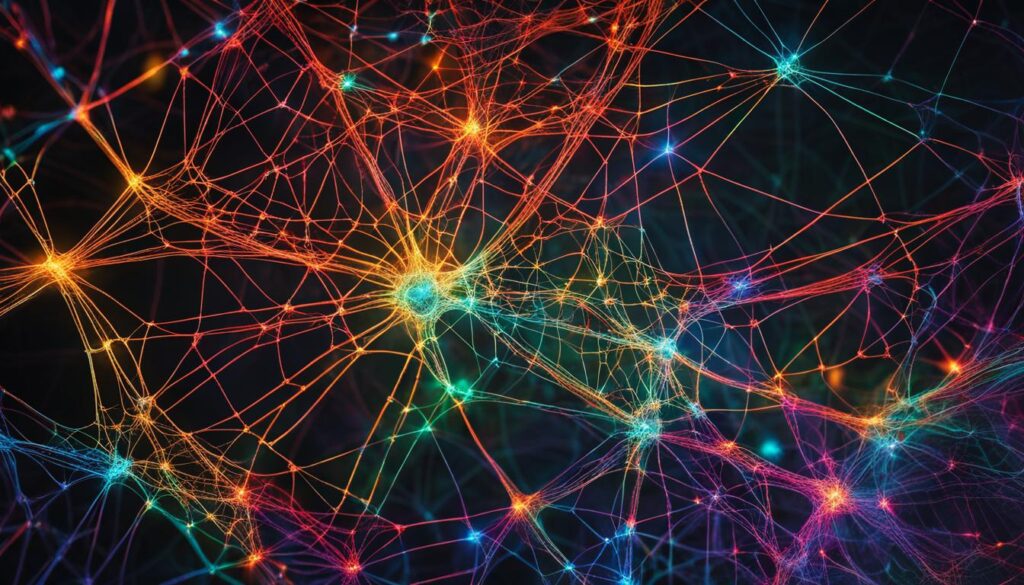Have you ever wondered what makes us tick and how our brains influence our behaviors, even the most unusual ones? The mysteries behind strange behaviors have fascinated researchers and experts for decades. With recent advancements in neurobiology, we are gaining a deeper understanding of the peculiar habits, odd conduct, and bizarre actions that puzzle us.
In this article, we will take a closer look at the quirky side of neurobiology and explore how it helps unravel the enigma of strange behaviors. From decoding abnormal conduct to understanding peculiar mannerisms and exploring unusual behavior patterns, we will examine the neurobiological factors that contribute to these behaviors.
Join us on this journey to delve into the fascinating world of neurobiology and discover the explanations behind some of the most perplexing and fascinating behaviors.
Understanding Unusual Actions
Humans exhibit a wide range of behaviors that can be considered unusual or peculiar. From strange habits to out-of-character actions, what drives these behaviors? Neurobiology may hold the key to understanding the underlying patterns and mechanisms that drive them.
At its core, neurobiology is the study of the nervous system and how it controls behavior. By studying the brain and its intricate network of neurons, researchers can better understand how these cells communicate and how they influence our actions and decisions.
One area of focus within neurobiology is the study of behavior patterns. Strange and unusual actions are often a result of behavior patterns that have developed over time. For example, someone with a habit of constantly biting their nails may be exhibiting the effects of a behavior pattern that has become ingrained in their daily routine.
Researchers are also interested in exploring the underlying brain structures and neurochemical processes that drive unusual behaviors. By examining the neurobiology of peculiar habits, they hope to gain insights into the mechanisms that drive these behaviors and improve our understanding of how the human brain works.
So what can we learn from the field of neurobiology when it comes to understanding unusual actions and peculiar habits? First and foremost, it can help us recognize the patterns and behavior sequences that drive these behaviors. By understanding the neurological mechanisms that underlie these actions, we can also develop more targeted treatments and therapies to help those who struggle with them.


Overall, the study of neurobiology offers a unique perspective on the many mysteries behind what makes us tick. By diving deeper into the inner workings of the human brain, we can develop a deeper appreciation and understanding of the complex behaviors that make us who we are.
Decoding Odd Conduct
Odd conduct and unexplained behavior can sometimes leave us scratching our heads, wondering what could have caused such abnormal actions. However, neurobiology research has provided some interesting insights into the factors that contribute to these perplexing behaviors.
One of the key neurobiological explanations for odd conduct and unexplained behavior is abnormalities in brain structure and function. Researchers have found that differences in brain chemistry and structure can result in abnormal behavior patterns. For example, individuals with certain neurotransmitter imbalances may exhibit impulsivity or risk-taking behaviors that seem unusual to others.
Another contributing factor to odd conduct and unexplained behavior is genetics. Studies have shown that certain genetic mutations can result in abnormal behaviors, such as compulsions or obsessions. Additionally, environmental factors such as traumatic experiences or exposure to drugs or toxins can also play a role in altering behavior patterns.
“By understanding the neurobiological underpinnings of odd conduct and unexplained behavior, we can better diagnose and treat individuals who may be struggling with these issues.”
Overall, neurobiology research has shed light on the fascinating and complex factors that contribute to abnormal behavior. From brain chemistry imbalances to genetic mutations, our understanding of the neurological roots of odd conduct and unexplained behavior continues to evolve.
Peering Into Peculiar Mannerisms
When we encounter someone with peculiar mannerisms, it’s easy to feel perplexed or even amused. However, there is a scientific explanation for these unique behaviors, and it lies in the world of neurobiology. By examining the connection between peculiar behavior patterns and neurobiology, we can gain a greater understanding of what makes us tick.
Peculiar mannerisms refer to behaviors that are out of the ordinary or unusual, such as repetitive movements, vocal tics, or obsessive-compulsive tendencies. These behaviors can be a sign of an underlying neurobiological condition, like Tourette’s syndrome or autism spectrum disorder.
Neurobiology is the study of the nervous system and how it influences behavior. By analyzing brain function and structure, researchers have discovered that unusual behavior can be caused by abnormalities in the brain’s structure or chemical makeup.
For example, a person with Tourette’s syndrome may exhibit peculiar mannerisms due to an overactive basal ganglia, a part of the brain responsible for movement control. Similarly, a person with obsessive-compulsive disorder may exhibit unusual behavior due to an imbalance in neurotransmitters like serotonin and dopamine.


By peering into the neurobiological factors that contribute to peculiar mannerisms, we can gain insight into the underlying causes of these unique behaviors. Understanding these patterns can help individuals seek appropriate treatment and therapies, as well as reducing the stigma surrounding unusual behavior.
Exploring Strange Behavior Patterns
Human behavior can often appear unpredictable and unusual, leaving us wondering what causes these peculiar habits and abnormal actions. Thanks to the field of neurobiology, we can begin to unravel the intricacies of these uncommon behavior patterns.
Research has shown that our neurobiological makeup plays a significant role in shaping the way we behave and react to various stimuli. From the way we interact with others to our response to stress, various neurobiological factors contribute to our unique behavior patterns.
These unusual behaviors can manifest in numerous ways, from social anxiety to obsessive-compulsive disorder. It’s crucial to understand the role of neurobiology in these patterns to help individuals struggling with such conditions to better comprehend and confront their condition.


By investigating the neurobiological underpinnings behind these strange behavior patterns, we can shed light on the reasons behind such unconventional actions. It also provides opportunities to develop new therapies and approaches in handling such abnormal behaviors.
Ultimately, understanding the contribution of neurobiology to peculiar habits and behavior patterns is crucial in helping us develop a comprehensive understanding of human behavior. This knowledge can help us better support individuals who face debilitating conditions caused by unusual behavior patterns.
Understanding Bizarre Actions
The human brain is undoubtedly a complex structure, with its numerous functions and processes playing a significant role in shaping our behavior patterns. Neurobiology, the study of the nervous system and its connection to behavior, has shed light on the perplexing nature of bizarre actions that can sometimes be seen in individuals.
Bizarre actions, defined as highly unusual or unexpected behavior, have long been of interest to researchers hoping to understand the abnormal psychological states that can provoke such conduct. Neurobiology has proven to be a valuable tool in this pursuit, providing insights into the factors that can contribute to such behavior.
For instance, studies have suggested that certain abnormalities in brain chemistry could lead to bizarre actions, with imbalances in hormones like serotonin and dopamine potentially influencing mood and behavior patterns.


Furthermore, abnormal behavior can sometimes stem from the brain’s response to traumatic events or stressful situations. These triggers can alter certain neural pathways, leading to behavioral changes that might be seen as bizarre or uncharacteristic by others.
“Neurobiology has proven to be a valuable tool in understanding the complex nature of bizarre actions in humans.”
Understanding the link between neurobiology and abnormal behavior patterns is a crucial step in gaining a deeper understanding of human conduct and helping those who may exhibit such behaviors. By unlocking the mysteries behind bizarre actions, we can develop strategies to intervene early and provide the necessary support and treatment to those in need.
Unveiling Strange Habits
Strange habits can be fascinating, perplexing, and sometimes even amusing. However, they can also be mysterious and difficult to understand. Neurobiology provides valuable insights into the complex factors that contribute to these peculiar behavioral tendencies.
One of the key ways in which neurobiology can help explain strange habits is by examining the behavior patterns that underlie them. For example, some individuals may have unusual eating habits that are linked to neurobiological factors, such as preferences for certain textures or flavors. Others may engage in repetitive behaviors, such as tapping their fingers or counting objects, which may be related to neurological conditions like OCD.
Furthermore, neurobiology can shed light on the role of environmental and genetic factors in shaping strange habits. Some habits may be inherited, while others may be learned as a coping mechanism for stress or anxiety. By understanding the underlying neurobiological mechanisms behind these peculiar behaviors, we can gain a deeper appreciation for the complexity and nuance of human behavior.
“The more we learn about the neurobiology of strange habits, the more we can appreciate the subtle ways in which our brains influence our behavior.”
Conclusion
In conclusion, neurobiology offers a fascinating lens for understanding and explaining strange behaviors. Through exploring unusual actions, odd conduct, peculiar mannerisms, and bizarre actions, we can uncover the neurobiological factors that contribute to these seemingly inexplicable behaviors. By delving into the intricacies of behavior patterns and strange habits, we can gain a deeper understanding of the brain and how it influences our actions.
In essence, neurobiology helps us make sense of what makes us tick and provides valuable insights into how we behave. By continuing to unravel the mysteries behind strange behaviors, we can pave the way for a better understanding of ourselves and those around us.
Overall, the study of neurobiology offers a unique and important perspective on the complexities of human behavior. By embracing this field of study, we can unlock new levels of understanding and appreciation for the quirks and idiosyncrasies that make us who we are.
